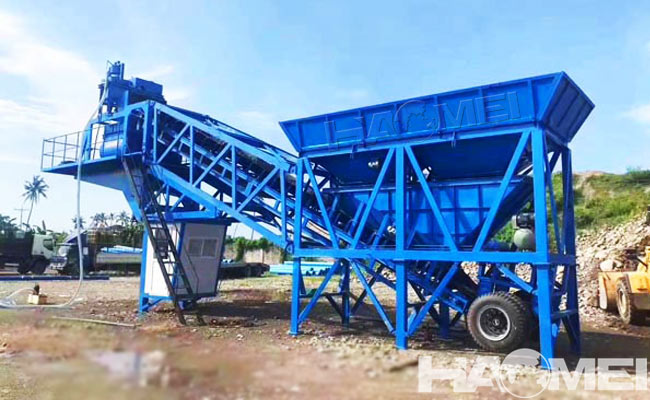Mobile Concrete Batching Plant Capacity
Mobile concrete batching plant capacity typically ranges from 25m³/h to 120m³/h, depending on the equipment model (specifications of the main mixer). Actual capacity is generally 10%-30% lower than the theoretical value, influenced by factors such as raw material supply and equipment condition.

1. Mainstream Models and Capacity (Theoretical vs. Actual)
Mobile concrete batching plant models are typically named by their "theoretical capacity." The key difference lies in the mixing volume of the main mixer (e.g., the JS500 has a single-shot mixing volume of 0.5m³).
YHZS25: Paired with the JS500 mixer (0.5m³/time), the theoretical capacity is 25m³/h, with an actual capacity of 18-22m³/h. It is suitable for small projects and rural construction.
YHZS35: Paired with the JS750 mixer (0.75m³/time), the theoretical capacity is 35m³/h, with an actual capacity of 28-32m³/h. It is suitable for municipal maintenance and small bridges.
YHZS50: Paired with the JS1000 mixer (1.0m³/time), the theoretical capacity is 50m³/h, with an actual capacity of 40-45m³/h. It is suitable for medium-sized construction sites and commercial housing construction.
YHZS75: Paired with the JS1500 mixer (1.5m³/time), the theoretical capacity is 75m³/h, with an actual capacity of 60-70 m³/h, suitable for large bridges and highways.
YHZS90: Paired with the JS2000 mixer (2.0 m³ per batch), the theoretical capacity is 90 m³/h, with an actual capacity of 80-85 m³/h. Suitable for large-scale infrastructure projects and industrial parks.
YHZS120: Paired with the JS3000 mixer (3.0 m³ per batch), the theoretical capacity is 120 m³/h, with an actual capacity of 95-110 m³/h. Suitable for ultra-large projects and centralized material supply.
2. Key Factors Influencing Mobile Concrete Batching Plant Capacity
- Raw Material Supply Efficiency:
Whether the storage capacity of raw materials such as sand, gravel, cement, and water is sufficient, and whether the conveyor belt/screw conveyor feeding speed matches the mixing rhythm of the mixer (sand and gravel blockage will directly interrupt production).
- Equipment Condition:
Worn mixing blades (resulting in uneven mixing and requiring remixing), batching scale inaccuracies (requiring rework and adjustment), and hydraulic system failures (affecting discharge speed) can all reduce mobile concrete batching plant capacity.
- Operational Proficiency:
The operator's familiarity with the equipment's start-up and shutdown rhythms and adjusting the raw material ratios—novice operators can easily extend production cycles due to operational delays (such as forgetting to start the discharge).
- Concrete Grade:
High-grade concrete (such as C60) requires longer mixing times (typically 60-90 seconds) and has a 20%-30% lower unit-time capacity than standard C30 concrete (30-45 seconds).
- External Environment:
Low temperatures (<5°C) slow cement hydration, requiring longer mixing times; high temperatures (>35°C) require more frequent moisture control, both of which can affect production efficiency.
3. Mobile Concrete Batching Plant Capacity Improvement Measures
- Optimize Raw Material Supply:
Stock at least 1-2 days' worth of raw materials in advance to avoid temporary restocking interruptions;
Pre-screen sand and gravel to remove impurities and prevent conveyor blockage;
Use a "dual silo" design to ensure continuous loading of sand, gravel, and cement.
- Equipment Maintenance and Upgrades:
Daily inspect the wear of the mixer blades and linings, and replace them promptly if wear exceeds 3mm;
Regularly calibrate the batching scale (once a week) to ensure batching accuracy (error ≤ ±1%);
Upgrade the hydraulic unloading system to reduce unloading time from 30 seconds to 15-20 seconds.
- Personnel and Process Optimization:
Train operators to master the "mixing - batching - unloading" process to avoid idle equipment;
Divide production by concrete grade (e.g., concentrate on C30 in the morning and C60 in the afternoon) to reduce parameter adjustment time;
Establish a "equipment inspector + raw material manager" team with clear division of labor to reduce troubleshooting time.
- Environmental Adaptability Adjustments:
In low-temperature environments, preheat mixing water (to 15-20°C) to shorten cement hydration time.
In high-temperature environments, install a sunshade over the aggregate silo to prevent excessive aggregate temperatures from causing premature initial setting of the concrete.
We Haomei Machinery is a leading company in the construction machinery industry, our YHZS mobile concrete batching plants utilize advanced manufacturing processes and high-quality raw materials, ensuring excellent stability and reliability. Their performance indicators meet internationally advanced standards, providing users with efficient and stable concrete production solutions. The mobile concrete batching plants offer stable and reliable quality, mature technology, and a variety of models and specifications to meet diverse user needs.
Inquiry
| (Please write down the product model or any requirement) | |
| E-mail: | |
| Message: | |
Contact Information
E-mail:chris@concretebatchplant24.com
Tel: +86-371-65621392
Fax:+86-371-86616825
Add : No.14 Waihuan Road,New strict,Zhengzhou,China


